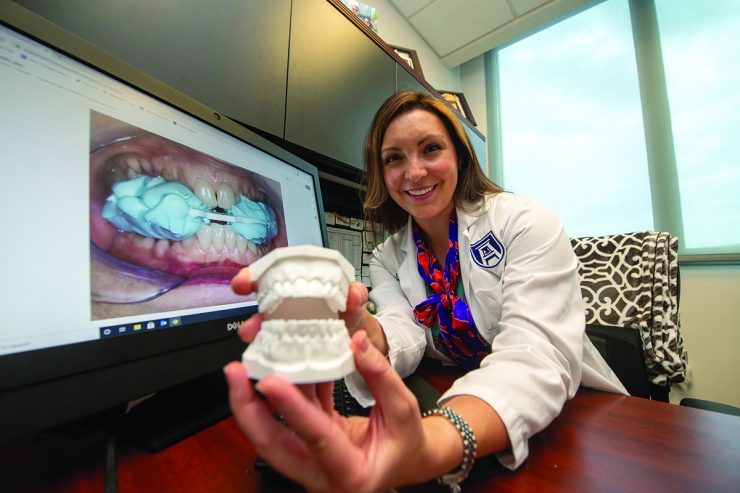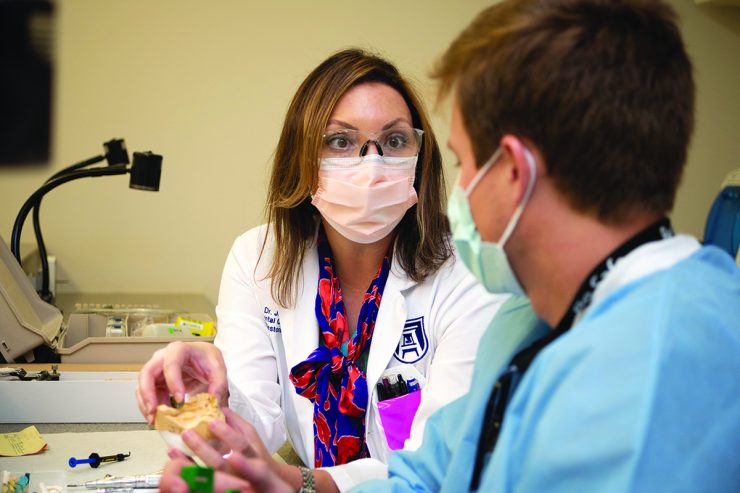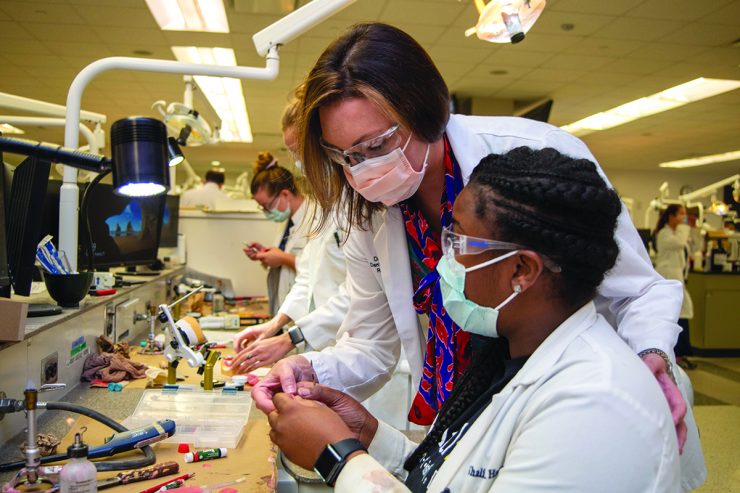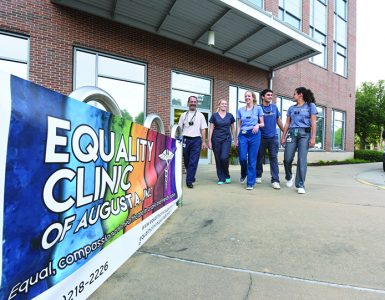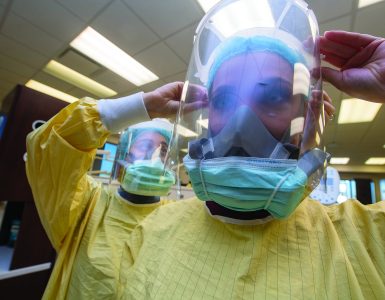Dr. Jacqueline Delash remembers, with a laugh, when lunch was the toughest part of her day.
Delash (’15), an instructor in the Department of Restorative Sciences and the Dental College of Georgia’s 2020 Outstanding Young Alumna, was always a natural in her academic pursuits. She enjoyed studying and learning, and she made top grades as a child in her hometown of Griffin, Georgia. However, her biggest challenge seemed to be making it through lunch.
“My parents are Croatian,” she says. “The town my family is from was heavily populated with Slovak immigrants, so I grew up speaking both Slovak and Croatian in our home — my mom spoke seven different languages — so I was always aware of differences between my classmates and me. But I didn’t realize how different until elementary school. That’s when kids started making fun of my lunches.”
Delash recalls that her mother would pack “very healthy Mediterranean-type foods with fresh bread my grandmother baked. My lunches didn’t look like anybody else’s, and after a while of being teased, I literally would not eat lunch.”
She says with a good-natured laugh that her mother finally relented after multiple entreaties and reluctantly switched to store-bought Wonder Bread and potato chips for her daughter’s lunches.
But compromises were strictly off limits in other areas of the little girl’s life. “Being a first-generation American and first-generation college student, education was crucial. From day one, my parents emphasized education for my two brothers and me,” Delash says. “My mother came to this country at the age of 20 speaking no English, looking for opportunity and a better life, traveling all alone and leaving her entire family behind. Her philosophy was, ‘I want you to be happy in what you’re doing, but get an education. Nobody can take that away.’”
Her daughter was more than willing to comply. Not only did she love learning, she loved teaching. She enjoyed sharing her culture with her friends, and she had a soft spot for people who, like her, felt they didn’t quite fit in. “I think that’s why I gravitated toward academia,” Delash says.
That inclination was reinforced while studying premed at Mercer University in Macon, Georgia. “I was always a good student, but I used to dread English courses and writing,” she acknowledges. “One of my college professors, whose wife was Russian, once said, ‘You write like my wife! Your sentence structure is sometimes just a little off.’ Clearly, my Eastern European roots were showing through, but he was truly instrumental in helping me to understand how to write well. From then on, I was excited about writing and I actually grew to love it. That’s what excites me about teaching. It’s great when areas of struggle become sources of inspiration and a thing you come to enjoy.”
But Delash’s path to academia was somewhat circuitous.
After earning her undergraduate degree, she earned a master’s degree in public health from Augusta University (then the Medical College of Georgia). “I loved it, but I graduated at the height of the 2008 recession, and it was hard to find a job. I ended up working with Dr. Lucy Marion [the recently retired dean of the Augusta University College of Nursing], and she was just a fabulous boss.”
Yet Delash missed the hands-on activities she had enjoyed all her life. Her father is an aircraft mechanic and her mother is a ceramist and dental lab owner. Delash was an avid apprentice at both of their knees, enjoying helping her father rivet together airplane wings in his hangar or assisting her mother at the dental lab. Having spent her formative years helping her mother, she eventually discovered that dentistry was an excellent fit.
“I took some prerequisites and really gave it everything I had,” she says. The hard work paid off; Delash enrolled in the DCG in 2011, graduating four years later.
“As a dental student, I realized how lucky I was to have grown up the way I did. From past work experiences to nurtured dexterousness, it just all came together with dentistry,” she says. “My classmates came from all different backgrounds. We all had something to learn from each other, and I enjoyed helping with lab projects, which came very naturally to me. It was something I already felt really close to.”
After earning her dental degree, Delash completed an Advanced Education in General Dentistry residency at the NYU Hospitals Center campus in Atlanta. She relished the work at Grady Health System and was gratified to be in the same state as her husband, Dr. Matt Rudy (an emergency medicine physician at University Hospital). One of her greatest sources of satisfaction during residency was the time spent working at Ben Massell Dental Clinic, which offers dental care for those unable to afford treatment.
She was particularly fascinated by her rotation in Grady’s Department of Ear, Nose and Throat Center. “I would work up patients for the ENT attending,” she says. “We saw everything from oral cancers to acid reflux. I was seeing a lot of dental wear on patients with reflux and sleep apnea [periodic breathing cessation during sleep], and I wanted to learn everything I could about how to treat them dentally.”
After completing her residency, she joined the DCG faculty and became a diplomate of the American Board of Dental Sleep Medicine. “The people who work here are so happy with what they do,” she says. “I love the camaraderie. It feels like one big family. And having every specialty under one roof makes everything so convenient.”
If completing two advanced degrees, a residency, and becoming a diplomate in sleep medicine wasn’t enough school for now, Delash enrolled in Augusta University’s Master of Business Administration program in 2018. In June 2020, she successfully graduated with an MBA.
In addition to teaching students and residents, Delash practices general dentistry in the Dental Associates Clinic, eagerly applying her hard-earned skills, including those related to sleep apnea. If she suspects the condition, she refers the patient to a physician for a formal workup and diagnosis. Then, many end up back in her clinic for treatment. “In cases of obstructive apnea (periodic blockage of the airway during sleep due to factors such as anatomical abnormalities or obesity), we use a mandibular advancement device to bring the lower jaw forward during sleep, which helps keep the airway open,” Delash says. “It fits in the mouth like a retainer. It’s much smaller than a CPAP (continuous positive airway pressure device, a common medical treatment for apnea) and it’s easy to clean. You can also travel with it. With good compliance, we have an 80 to 90 percent success rate.”
Another form of apnea — central sleep apnea — involves the lungs failing to alert the brain to a lack of oxygen. “That’s the type that is typically treated with CPAP or with combination therapy,” Delash says. Either way, she stresses the importance of both medical and dental intervention, particularly since all forms of apnea can cause premature tooth wear and other oral issues.
In fact, Delash believes apnea is so vital to overall health that she has incorporated it into the pre-doctoral curriculum.
Delash is also a great believer in cheerfully rolling with the punches. For instance, although the COVID-19 pandemic has thrown a monkey wrench into DCG’s normal operations (see page 10), she has found the challenge replete with teachable moments regarding qualities such as resilience and adaptability.
“I emphasize that every day is a learning opportunity,” says Delash. “I tell students to take things day by day. I try to help them learn how to cope with stress and handle situations that don’t go as planned. Supporting them is why I’m here, and that goes for the entire faculty as well: We love our students and want them to be successful.”

